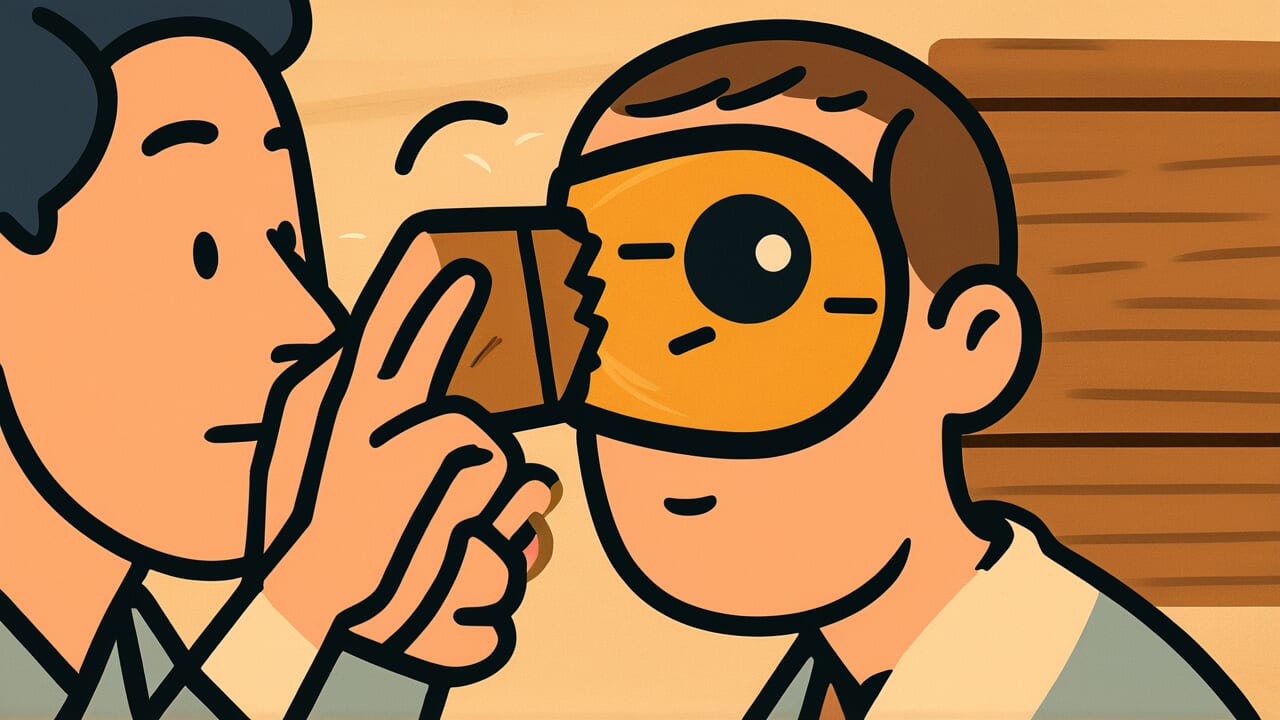How to Read “Poke your eye with the metal fitting you despised”
Iyashimu kanaki de me wo tsuku
Meaning of “Poke your eye with the metal fitting you despised”
This proverb means that even something cheap and worthless can cause real pain if it pokes your eye.
It teaches us that anything we look down on can still have power and influence. The saying uses irony to make its point.
People use this proverb when something they underestimated has an unexpected impact. It fits situations where carelessness leads to painful consequences.
You might say it when thinking “that insignificant thing” actually brought serious results.
The proverb works better than simply saying “don’t underestimate things.” The image of physical pain makes the lesson more memorable and vivid.
Today, this wisdom still applies. A small competitor might steal your market share. A minor problem might grow into a major crisis.
The lesson is clear: everything has power that shouldn’t be ignored. Recognizing this helps us stay careful and humble in all situations.
Origin and Etymology
No clear written records explain the origin of this proverb. However, we can learn much from examining its parts.
“Kanaki” refers to metal tools and implements. During the Edo period, metal items were valuable to common people.
Even crude metal tools were treated with care. “Iyashimu” means to look down on something or consider it worthless.
The expression likely came from real-life experiences. Even a cheap metal piece causes intense pain if it enters your eye.
This is a physical fact. The quality of metal doesn’t matter when it pokes your eye. The pain is the same regardless.
From this reality, people drew a deeper lesson. Things we despise can still have power we cannot ignore.
This experience is timeless. Throughout history, people have faced unexpected consequences from things they dismissed.
The proverb became ironic in tone. It warns against human arrogance and the danger of hasty judgments.
Our ancestors showed wisdom by expressing this truth through the sensation of pain. It makes the lesson unforgettable.
Usage Examples
- I underestimated that new employee, but “poke your eye with the metal fitting you despised” – he successfully completed the project
- We let our guard down because it was a small company, but “poke your eye with the metal fitting you despised” – they quickly stole our market share
Universal Wisdom
“Poke your eye with the metal fitting you despised” warns against a fundamental human flaw: arrogance.
We constantly rank things, judge their value, and create hierarchies. Once we decide something is worthless, we stop paying attention to it.
But reality doesn’t match our judgments. A cheap metal piece still hurts when it pokes your eye.
Things we despise can affect us in unexpected ways. This pain isn’t just physical. It can be emotional and social too.
The proverb reveals the world’s complexity and unpredictability. Everything has some kind of power.
Even the smallest thing can have major impact under the right conditions. Our ancestors linked this truth to everyday pain.
This made the lesson impossible to forget.
Looking down on someone or something actually narrows our vision. It invites danger into our lives.
Humility isn’t just a virtue. It’s also wisdom for survival.
When AI Hears This
People who put themselves down often attack others more easily. Brain structure explains this phenomenon.
The human brain feels stress when holding contradictory information. It struggles with “I have no value” versus “I am alive.”
The brain unconsciously tries to resolve this contradiction. One strategy is attacking others to raise your relative position.
Someone earning $30,000 yearly and feeling unhappy won’t envy someone making $50,000. Instead, they look down on someone making $20,000.
This brings psychological stability. Subtraction requires less cognitive effort than addition.
Putting others down takes less energy than improving yourself.
More interesting is where these attacks target. People attack the areas where they feel most inferior.
Those with education complexes criticize others’ education. People insecure about appearance criticize others’ looks.
Psychology calls this “projection.” We project unacceptable feelings onto others and attack them there.
This temporarily escapes self-hatred through a defense mechanism.
The proverb shows how inferiority pain converts into outward attacking energy. It’s an energy-saving psychological mechanism in humans.
Lessons for Today
This proverb teaches the practical value of staying humble. In business and relationships, underestimating others makes us miss important information.
Modern society overflows with information. We cannot pay attention to everything.
So we quickly judge what matters and what doesn’t. But are we judging only by flashy appearances and surface value?
Small companies have innovative ideas. Junior employees make fresh proposals. Minor customer complaints matter.
Seemingly insignificant competitor moves matter too. All these can have major impact under the right conditions.
The proverb doesn’t tell us to fear everything. Rather, it says don’t treat your judgments as absolute.
Keep asking “what if?” That flexible attitude protects you from unexpected pain.
It also helps you notice new possibilities. A mind that doesn’t look down on things expands your vision.
This leads to a richer, fuller life.



Comments